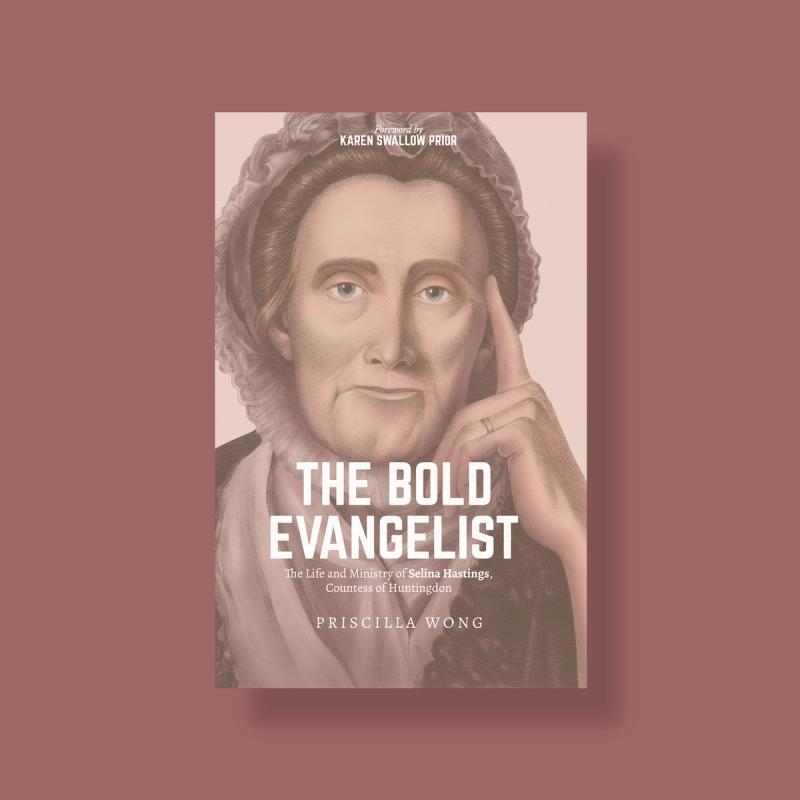Her contemporaries called her “the Queen of the Methodists,”[1] “Lady Bountiful,”[2] “a Mother in Israel,”[3] “a Mother to the poor,”[4] and “a star of the first magnitude in the firmament of the church.”[5] Philip Doddridge went as far as saying he had never seen “so much of the image of God in a woman upon earth”[6] as he did in Selina Hastings, Countess of Huntington. In fact, many agree that the 18th-century English revival wouldn’t have had the same impact without her commitment and dedication.
And yet, today her name is overshadowed by those of the same men who considered her essential to their work – men like John and Charles Wesley, George Whitefield, and Augustus Toplady.
While there are some biographies of Selina Hastings already in print[7], Priscilla Wong has done a great service by writing an accessible, well-researched, well-written, and well-structured biography for those who want to learn more about this exceptional woman without (yet) committing to a longer study.
What impressed me the most about Wong’s The Bold Evangelistis the lucid organization of her narrative. In less than 160 pages, Wong takes the reader through the life of Selina Hastings, her interactions with the leaders of the English revival, and the consequences of the hard decisions made. She presents a sympathetic, but honest view of Selina’s strengths and weaknesses and the many nuances of her life as a wife, mother, friend, evangelist, church planter, and benefactor. Her unassuming style draws the reader into the story so that, at the end of the book, Selina Hastings may seem like a friend we have known for some time.
The bulk of the narrative is a straightforward description of historical facts with a careful avoidance of hagiographical portraits. In fact, Wong believes that Selina Hastings’s shortcomings, together with “the suffering she endured as a wife and more enable us to connect with her even more deeply” (4).
In the Introduction and in the final chapter of her book, however, Wong shares freely her personal opinions and some lessons she has learned from the countess’s life. The reader might, in some cases, reach different conclusions. In my case, the description of the countess’s productivity, even in her old age, left me more exhausted than willing to emulate her. But I still agree with Wong when she says that Hastings’s example “serves as great encouragement when it comes to our own spiritual journeys and what God has called each one of us to do” and with Wong’s prayer that “the life and ministry of Selina Hastings inspire us to go forward, as she had, with her eyes set not on this kingdom but the One to come” (5).
I also appreciated Wong’s emphasis on the importance of the Christian community in Selina Hastings’s life as “a vital anchor in her journey as a believer” (153). I believe this is an important reminder today.
Demonstrating a strong belief in Christ’s work in the life of the church, Wong is able to highlight the unity among believers while recounting a time of serious differences and controversies. After describing the unique contributions of strong personalities all-too prone to clash with each other, Wong reminds us of Hastings’s words to Charles Wesley, “There is something at the bottom of old friendship in our Lord’s family that is like Himself having loved His own, He loves them to the end.”[8] This positive look at the English revival, coupled with Wong’s gift of delivering clear and succinct descriptions, has allowed me to come to a more balanced understanding of that time period and to keep my eyes on Christ’s promises to his church among today’s seemingly intensifying frictions.
Simonetta Carr is the author of numerous books, including Broken Pieces and the God Who Mends Them: Schizophrenia through a Mother’s Eyes, and the series Christian Biographies for Young Readers (Reformation Heritage Books)
[1] Sarah Tytler, The Countess of Huntington and Her Circle, London: Sir Isaac Pitman and Sons, 1907, (quoting writer and politician Horace Walpole), 43 (At that time, the term “Methodist” didn’t yet describe a denomination.
[2] John R. Tyson and Boyd Stanley Schlenther, In the Midst of Early Methodism: Lady Huntington and her Correspondence, Maryland: Scarecrow Press, 2006, (quoting Selina Hasting’s relative and earliest biographer, Aaron Seymour), 1
[3] Tyson and Schlenther, In the Midst of Early Methodism, (quoting George Whitefield), 1.
[4] Tyson and Schlenther, In the Midst of Early Methodism, (quoting nonconformist minister Philip Doddridge), 1.
[5] Faith Cook, Selina: Countess of Huntingdon: Her Pivotal Role in the 18th Century Evangelical Awakening, The Banner of Truth Trust, 2001, (quoting Anglican minister Henry Venn), 269.
[6] Faith Cook, Selina, 124.
[7] Most notable, Faith Cook, Selina: Countess of Huntingdon: Her Pivotal Role in the 18th Century Evangelical Awakening, The Banner of Truth Trust, 2001
[8] Wong, The Bold Evangelist, 153, quoting Tyson, Lady Huntingdon and Her Correspondence, 75 (emphasis original).




